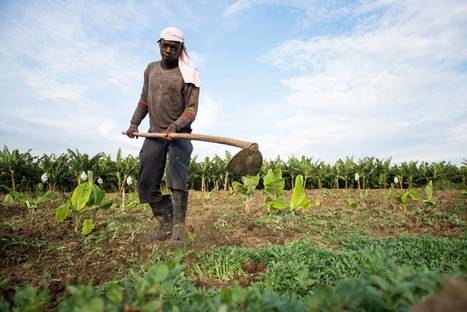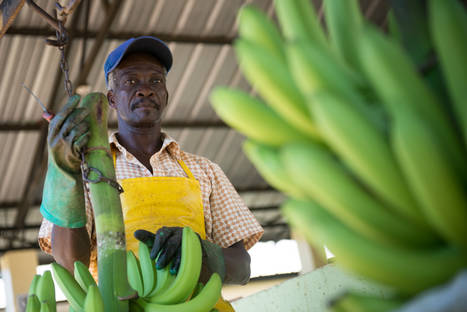Migrant workers in the banana industry

The United Nations International Convention on the Protection of the Rights of all Migrant Workers and Members of their Families (1990) defines a migrant worker as “a person who is engaged or has been engaged in a remunerated activity in a state of which he or she is not a national”. This definition includes temporary migrant workers (e.g. seasonal workers in agriculture).
A similar definition of "migrant for employment" is also provided by the ILO in Article 11, paragraph 1, of the Convention No. 97 and forms the basis of the provisions of Part II of Convention No. 143.
According to recent ILO estimates, there are 150.3 million migrant workers in the world, of which 44.3 percent are women.1 However, in the banana industry migrant workers are predominantly male. This is due to their relative ability to travel according to family responsibilities, and also because of gender discrimination in employment opportunities for women in the industry. Migrant workers are a particularly vulnerable population, especially when undocumented.
Examples of migration profiles in the global banana industry:
- Haitians in the northeast of Dominican Republic;
- Nicaraguans in the northeast of Costa Rica;
- indigenous Panamanians in the south of Costa Rica;
- Peruvians in southern Ecuador;
- Hondurans in Belize and Guatemala;
- Burkina and Malian workers in northern Cote d’Ivoire;
- Nigerians in western Cameroon.
Challenges faced by migrant workers in the banana industry include:
- Employment insecurity, being more likely to be on temporary, less competitive contracts (or informal/oral contracts) and through non-standard including casual work arrangements2;
- Minimal bargaining power to improve their working conditions, particularly as migrant workers tend to be less likely to join a local trade union due to fear of discrimination, repression and deportation (if undocumented). Legislative restrictions on the right of migrants or foreign workers to form or join trade unions, often based on residency requirements and principles of reciprocity, may prevent them from playing an active role in the defence of their interests.3 Language barriers can also greatly affect migrant workers bargaining power.
- Temporary and sub-standard accommodation.
- Limited or no access to local healthcare and social security, constituting a particular issue in the banana industry due to the significant health and safety risks for workers.4

Example of Haitians working in the Dominican Republic
The Dominican Republic5 is the largest exporter of organic bananas worldwide. It is estimated that more than 30 000 workers are directly involved in the industry6, of which more than 65% are of Haitian origin (with approximately 8% being women), despite the fact that the National Labour Code provides that employers may not hire foreign labor when it exceeds 20%, except in specific cases established by law.
The hiring of Haitian workers in banana production is a relatively recent phenomenon, dating from 2000 as a result of the resurgence and expansion of banana production and exports.
In 2014, the government launched the National Plan of Regularization of Foreigners (PNRE), aiming to legalize the irregular status of foreign nationals residing in the Dominican Republic, to improve the living and working conditions of workers and to strengthen the country’s national security. By 2016, close to 250 000 records of foreign nationals, of which 98% were from Haitian workers, were approved7.
In the same year, an independent rural workers’ federation affiliated to the country’s largest trade union confederation (FEDELAC-CASC), with a tradition of organizing small farmers who gained their land through agrarian reform programmes, started to organize agricultural workers, notably in the banana industry in Montecristi and Mao provinces. The new territorial trade unions registered in 2015 and 2016 include several hundred small growers of Dominican nationality organized in a collective leasehold, as well as several hundred Haitians working in dozens of farms across the Linea Noroeste. The Federation plays a key role in the implementation of the Regularization Plan and the ongoing dialogue and bargaining for the respect of migrant (and non-migrant) worker’s rights in the industry.

Example of BANELINO, a Fairtrade certified banana cooperative operating in the Mao and Monte Cristi (North-West) provinces in the Dominican Republic
Example of BANELINO, a Fairtrade certified banana cooperative operating in the Mao and Monte Cristi (North-West) provinces in the Dominican Republic
Example of BANELINO, a Fairtrade certified banana cooperative operating in the Mao and Monte Cristi (north-west) provinces in the Dominican Republic
In the context of the PNRE, and in order to comply with Fairtrade certification requirements for exportation (at least 95% of immigrant workers must have a legal status), BANELINO implemented the following steps:
- establishing a legal technical area to provide support to migrant workers from partners;
- establishing a census of labour migration, determining the total number of workers, their personal data, identity cards and length of time in the country;
- raising awareness among producers and workers on the importance of regularizing migrant workers;
- managing with consulates in the neighbouring country to provide national identity documents (birth certificates and passports);
- preparing records for all workers with the legal documentation required by the Department of the PNRE;
- arranging PNRE registration and regularization of migrant workers;
- monitoring the delivery process for visas and work permits to workers enrolled in the PNRE.
Results
- Technical assistance to migrant workers with actions taken to obtain their regularization or to renew their visa in the context of the PNRE.
- A greater awareness of the need for passport and legal processes to regularize their immigration status and that of their families.
- Producers and workers know the importance of formalizing labour relations.
- Greater health and empowerment, which can be seen in greater self-esteem and more displacements from one place to another.
Lessons learned
- Language: Interpreters are necessary to facilitate communication between workers and the institutions.
- Legal aspects: The requirements to apply for regularization are very difficult to obtain for a worker who does not have legal assistance. Workers often don’t know their date of birth or the community in which they were born as this has not been declared at their birth in their country of origin. They lack identity documents, which are very difficult to obtain and have a high cost at consular offices. The company therefore needed a proactive technical legal team to manage and process migration records, and also interact effectively with workers.
- Institutional aspects: The timeframe to apply for regularization is short, while the delivery of visas and work permits from consulates and government institutions takes a long time.
References
References
1 ILO. 2015. Global estimates on migrant workers
2 International Labour Organization, Food and Agriculture Organization, International Union of Food, Agricultural, Hotel, Restaurant, Catering, Tobacco and Allied Workers’ Associations. 2007. Agricultural workers and their contribution to sustainable agriculture and rural development.
3 ILO. 2015. Giving a voice to rural workers
4 International Labour Organization. Social protection for low-skilled migrant workers and their families. Policy Brief No. 7. Migrant Forum in Asia. September 2013
5 All information provided by BANELINO
6 BANELINO
7 Ministerio de Interior y Policía. National Plan of Regularization of Foreign Workers (PNRE)

